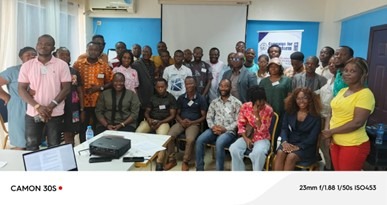The Center for Legal Aid Support Services (CLASS), a Liberian advocacy group, has launched a comprehensive campaign to bolster access to justice for all citizens. This initiative focuses on promoting the passage of three crucial bills currently under consideration by the Liberian Legislature: the Legal Aid Services Act, the Liberia Corrections Service Act, and the Alternative Dispute Resolution (ADR) Act. These legislative instruments are deemed essential for strengthening the nation’s justice and security framework, and CLASS, with support from the United Nations Development Programme (UNDP), is actively working to facilitate their enactment.
A key component of CLASS’s strategy is engaging and educating various stakeholders about the legislative process and the importance of these pending bills. To this end, CLASS organized a consultative workshop with media professionals, civil society organizations, and legislative representatives. The workshop, held in Monrovia, aimed to foster collaboration and develop effective advocacy strategies to advance the legislative agenda. Attorney George King, a prominent figure within CLASS, emphasized the significance of utilizing the expertise and influence of national actors, particularly media outlets and civil society groups, in driving legal reform. He underscored that this workshop is part of a broader, multi-stage effort to engage the legislature on necessary law reforms, amendments, and the creation of new laws that prioritize the safety and security of the Liberian people. The workshop proceedings emphasized the importance of public awareness and understanding of the legislative process, recognizing the need to share experiences, challenges, and successes encountered in navigating this complex system.
Expert insights on legislative engagement were shared by Joseph Cheayan, Executive Director of the Institute for Democratic Action and Development (IDAD). He stressed the importance of strategic communication with lawmakers, advising advocates to be concise, direct, and focus on the tangible benefits of proposed legislation. Cheayan highlighted the need to understand the legislative landscape, including identifying the relevant committees to approach, as crucial for effective advocacy. He further outlined a range of engagement strategies, including submitting formal letters and petitions, arranging direct meetings with legislators, and participating in policy dialogues and briefings to influence legislative outcomes.
Robert Myers, a Legislative Research Analyst at the Liberian Senate, provided a valuable perspective on the challenges inherent in the legislative process. He pointed out that many lawmakers do not thoroughly review legislative documents, a factor that can significantly impede the passage of important bills. Myers stressed the vital role of coordination with bill sponsors and co-sponsors to navigate bureaucratic obstacles and ensure legislative progress. Participants in the workshop offered constructive suggestions, including the establishment of a dedicated Steering Committee within CLASS to address specific thematic areas related to legislative engagement. This committee would play a crucial role in coordinating advocacy efforts and ensuring that strategies are focused and impactful.
The workshop signifies a substantial step forward in CLASS’s broader campaign to reform Liberia’s legal system and enhance access to justice for all citizens. By raising awareness about the lawmaking process and actively involving key stakeholders, CLASS aims to generate momentum and support for the passage of these critical legal reforms. The organization’s commitment to fostering collaboration and providing essential legal services underscores its crucial role in strengthening Liberia’s justice system.
The three bills championed by CLASS, the Legal Aid Services Act, the Liberia Corrections Service Act, and the Alternative Dispute Resolution (ADR) Act, represent crucial steps toward a more just and equitable society. The Legal Aid Services Act seeks to ensure that all citizens, regardless of their socioeconomic status, have access to legal representation. The Liberia Corrections Service Act aims to reform the prison system, promoting humane conditions and rehabilitation for incarcerated individuals. Finally, the ADR Act promotes alternative methods of dispute resolution, offering more efficient and accessible avenues for resolving conflicts outside of the traditional court system. The passage of these bills would mark a significant milestone in strengthening Liberia’s rule of law and promoting access to justice for all. CLASS’s dedicated efforts to advocate for these reforms, coupled with their engagement with various stakeholders, demonstrate their unwavering commitment to a more just and equitable Liberia.














